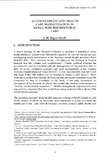Accountability and Health Care Marketization in Kenya: Why Reform Public Law

View/
Date
2005Author
Akech, Migai, J.M
Type
ArticleLanguage
enMetadata
Show full item recordAbstract
A recent attempt by the Ministry of Health to establish a mandatory social
health insurance scheme was vehemently opposed by various inter-est. groups,
culminating in the withdrawal of the National Social Health Insurance Fund
(NSHIF) Bill.' Their concerns varied. For instance, the Minister of Finance
thought that the scheme was unaffordable.? Others doubted whether the
government could be entrusted with the management of the proposed fund in
light of recent corruption scandals and poor management of the existing
National Health Insurance Fund (NHIF).3 It was thus reported that the NHIF
lost some KShs. 300 million due to fraudulent claims in 2003 alone.s There
were also concerns that because all Kenyans and permanent residents would be
compelled by law to contribute to the fund, it not only constituted an
abrogation of the freedom of choice= but would also lead to extra taxation of
"already overburdened taxpayers."6 Health management organizations were
also gravely concerned that they. would lose a large portion of their clients if the
NSHIF Bill became law.?
The proposed National Social Health Insurance Scheme (NSHIS) should be seen
in the context of efforts by successive administrations in Kenya to reform the
health care sector. Like other developing countries, Kenya's public health care
Citation
East African Law Journal Vol 2 2005Publisher
University of Nairobi
Rights
Attribution-NonCommercial-NoDerivs 3.0 United StatesUsage Rights
http://creativecommons.org/licenses/by-nc-nd/3.0/us/Collections
The following license files are associated with this item:

